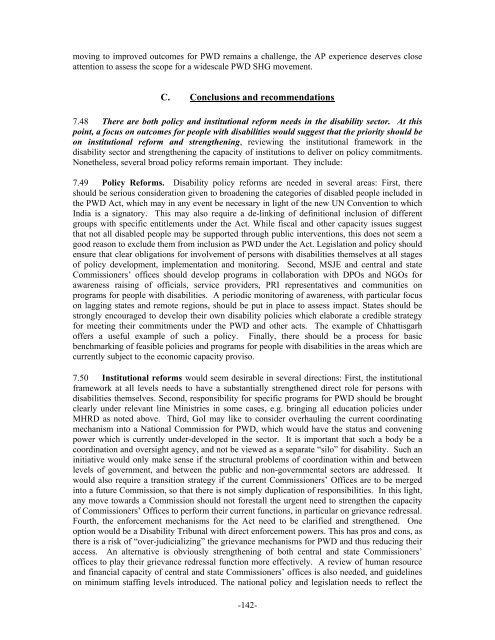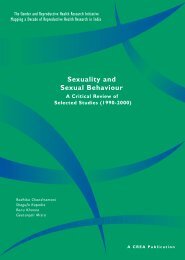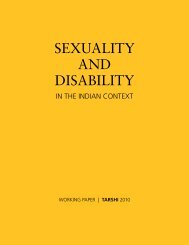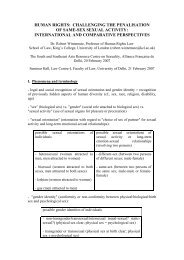People with Disabilities in India: From Commitment to Outcomes
People with Disabilities in India: From Commitment to Outcomes
People with Disabilities in India: From Commitment to Outcomes
You also want an ePaper? Increase the reach of your titles
YUMPU automatically turns print PDFs into web optimized ePapers that Google loves.
mov<strong>in</strong>g <strong>to</strong> improved outcomes for PWD rema<strong>in</strong>s a challenge, the AP experience deserves close<br />
attention <strong>to</strong> assess the scope for a widescale PWD SHG movement.<br />
C. Conclusions and recommendations<br />
7.48 There are both policy and <strong>in</strong>stitutional reform needs <strong>in</strong> the disability sec<strong>to</strong>r. At this<br />
po<strong>in</strong>t, a focus on outcomes for people <strong>with</strong> disabilities would suggest that the priority should be<br />
on <strong>in</strong>stitutional reform and strengthen<strong>in</strong>g, review<strong>in</strong>g the <strong>in</strong>stitutional framework <strong>in</strong> the<br />
disability sec<strong>to</strong>r and strengthen<strong>in</strong>g the capacity of <strong>in</strong>stitutions <strong>to</strong> deliver on policy commitments.<br />
Nonetheless, several broad policy reforms rema<strong>in</strong> important. They <strong>in</strong>clude:<br />
7.49 Policy Reforms. Disability policy reforms are needed <strong>in</strong> several areas: First, there<br />
should be serious consideration given <strong>to</strong> broaden<strong>in</strong>g the categories of disabled people <strong>in</strong>cluded <strong>in</strong><br />
the PWD Act, which may <strong>in</strong> any event be necessary <strong>in</strong> light of the new UN Convention <strong>to</strong> which<br />
<strong>India</strong> is a signa<strong>to</strong>ry. This may also require a de-l<strong>in</strong>k<strong>in</strong>g of def<strong>in</strong>itional <strong>in</strong>clusion of different<br />
groups <strong>with</strong> specific entitlements under the Act. While fiscal and other capacity issues suggest<br />
that not all disabled people may be supported through public <strong>in</strong>terventions, this does not seem a<br />
good reason <strong>to</strong> exclude them from <strong>in</strong>clusion as PWD under the Act. Legislation and policy should<br />
ensure that clear obligations for <strong>in</strong>volvement of persons <strong>with</strong> disabilities themselves at all stages<br />
of policy development, implementation and moni<strong>to</strong>r<strong>in</strong>g. Second, MSJE and central and state<br />
Commissioners’ offices should develop programs <strong>in</strong> collaboration <strong>with</strong> DPOs and NGOs for<br />
awareness rais<strong>in</strong>g of officials, service providers, PRI representatives and communities on<br />
programs for people <strong>with</strong> disabilities. A periodic moni<strong>to</strong>r<strong>in</strong>g of awareness, <strong>with</strong> particular focus<br />
on lagg<strong>in</strong>g states and remote regions, should be put <strong>in</strong> place <strong>to</strong> assess impact. States should be<br />
strongly encouraged <strong>to</strong> develop their own disability policies which elaborate a credible strategy<br />
for meet<strong>in</strong>g their commitments under the PWD and other acts. The example of Chhattisgarh<br />
offers a useful example of such a policy. F<strong>in</strong>ally, there should be a process for basic<br />
benchmark<strong>in</strong>g of feasible policies and programs for people <strong>with</strong> disabilities <strong>in</strong> the areas which are<br />
currently subject <strong>to</strong> the economic capacity proviso.<br />
7.50 Institutional reforms would seem desirable <strong>in</strong> several directions: First, the <strong>in</strong>stitutional<br />
framework at all levels needs <strong>to</strong> have a substantially strengthened direct role for persons <strong>with</strong><br />
disabilities themselves. Second, responsibility for specific programs for PWD should be brought<br />
clearly under relevant l<strong>in</strong>e M<strong>in</strong>istries <strong>in</strong> some cases, e.g. br<strong>in</strong>g<strong>in</strong>g all education policies under<br />
MHRD as noted above. Third, GoI may like <strong>to</strong> consider overhaul<strong>in</strong>g the current coord<strong>in</strong>at<strong>in</strong>g<br />
mechanism <strong>in</strong><strong>to</strong> a National Commission for PWD, which would have the status and conven<strong>in</strong>g<br />
power which is currently under-developed <strong>in</strong> the sec<strong>to</strong>r. It is important that such a body be a<br />
coord<strong>in</strong>ation and oversight agency, and not be viewed as a separate “silo” for disability. Such an<br />
<strong>in</strong>itiative would only make sense if the structural problems of coord<strong>in</strong>ation <strong>with</strong><strong>in</strong> and between<br />
levels of government, and between the public and non-governmental sec<strong>to</strong>rs are addressed. It<br />
would also require a transition strategy if the current Commissioners’ Offices are <strong>to</strong> be merged<br />
<strong>in</strong><strong>to</strong> a future Commission, so that there is not simply duplication of responsibilities. In this light,<br />
any move <strong>to</strong>wards a Commission should not forestall the urgent need <strong>to</strong> strengthen the capacity<br />
of Commissioners’ Offices <strong>to</strong> perform their current functions, <strong>in</strong> particular on grievance redressal.<br />
Fourth, the enforcement mechanisms for the Act need <strong>to</strong> be clarified and strengthened. One<br />
option would be a Disability Tribunal <strong>with</strong> direct enforcement powers. This has pros and cons, as<br />
there is a risk of “over-judicializ<strong>in</strong>g” the grievance mechanisms for PWD and thus reduc<strong>in</strong>g their<br />
access. An alternative is obviously strengthen<strong>in</strong>g of both central and state Commissioners’<br />
offices <strong>to</strong> play their grievance redressal function more effectively. A review of human resource<br />
and f<strong>in</strong>ancial capacity of central and state Commissioners’ offices is also needed, and guidel<strong>in</strong>es<br />
on m<strong>in</strong>imum staff<strong>in</strong>g levels <strong>in</strong>troduced. The national policy and legislation needs <strong>to</strong> reflect the<br />
-142-










